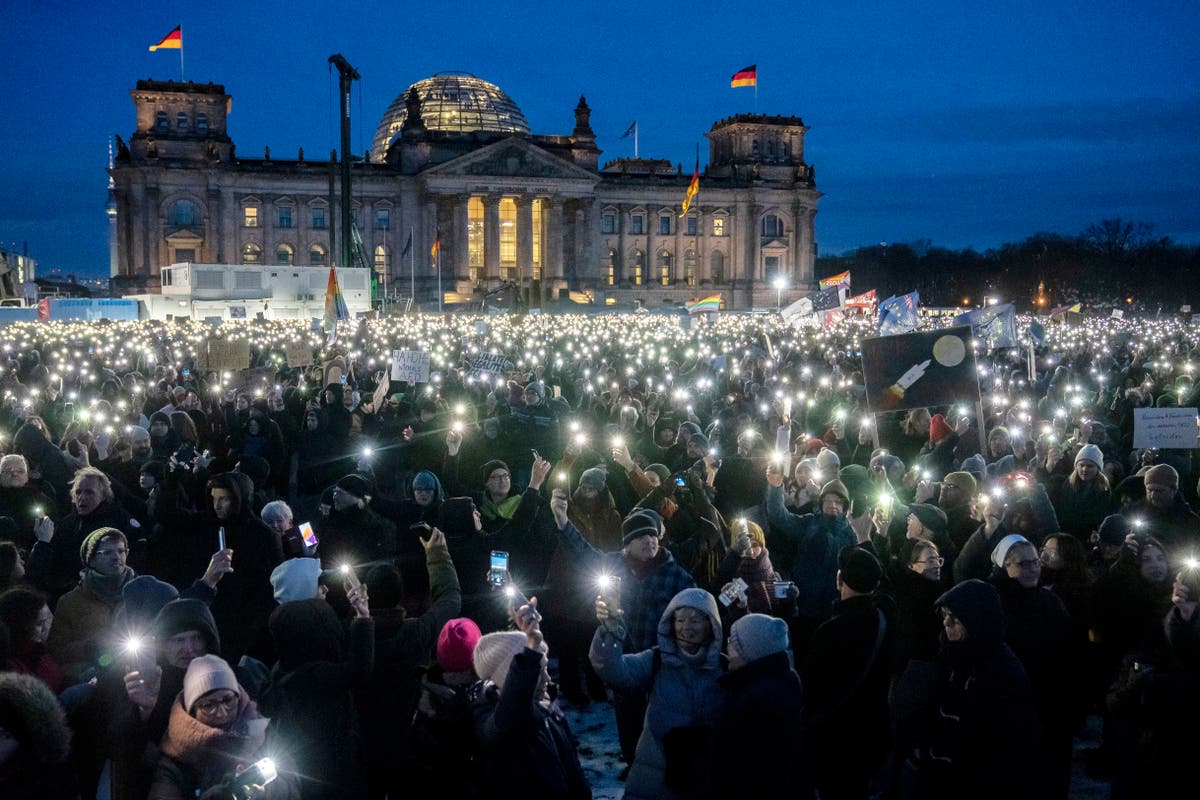Nicki Kämpf watched her daughter toddle across the sand in a Berlin playground and wondered whether she and her wife should move their 1 1/2-year-old west, after Alternative for Germany became the first far-right party to win a state election in post-World War II Germany.
Kämpf, 29, and her wife discussed a backup plan as Sunday’s election results came in. They’re concerned that a gay couple and their child might not be safe in the future if parties like Alternative for Germany, or AfD, gain more power in the formerly communist and less prosperous eastern states.
Even though they live in the liberal city of Berlin, Kämpf was scared the far-right’s power could spread. She’s especially worried because the paperwork to formally adopt her daughter is still pending — and could be for another year or more.
“I don’t think I would be able to adopt her if they’re in power,” Kämpf told The Associated Press on Monday. “I don’t want to bring her up in a hostile environment.”
The couple talked about a possible move west to Cologne — “people there are really open-minded” — but Kämpf is reluctant to take their daughter far from the toddler’s 91-year-old great-great-grandmother and other family in Thuringia and neighboring Saxony.
AfD won its state election in Thuringia on Sunday under one of its hardest-right figures, Björn Höcke. In Saxony, the party finished only just behind the mainstream conservative Christian Democratic Union, which leads the national opposition.
Deep discontent with a national government notorious for infighting, inflation and a weak economy, anti-immigration sentiment and skepticism toward German military aid for Ukraine are among the factors that contributed to support for populist parties. A new party founded by a prominent leftist was the second big winner on Sunday — and will probably be needed to form state governments since no one is prepared to govern with AfD.
AfD is at its strongest in the east, and the domestic intelligence agency has the party’s branches in both Saxony and Thuringia under official surveillance as “proven right-wing extremist” groups. Höcke has been convicted of knowingly using a Nazi slogan at political events, but is appealing.
Höcke bristled Sunday when an ARD interviewer mentioned the intelligence agency’s assessment, responding: “Please stop stigmatizing me. We are the No. 1 party in Thuringia. You don’t want to classify one-third of the voters in Thuringia as right-wing extremist.”
Voters went to the polls on the 85th anniversary of Nazi Germany’s invasion of Poland at the start of World War II. Some far-left protesters demonstrated against AfD in Hamburg, Dresden and Leipzig.
Lukas Meister said his sons, 6 and 3 years old, are too young to understand elections. But as the 3-year-old played with sand toys Monday, the 38-year-old father thought about how his eldest child will have to learn about it someday.
“We don’t talk much about politics so far. He’s more into ‘Paw Patrol,’” Meister said. “It’s hard to explain. How is it that people are so proud to vote for a party that is so bad for everyone?”
Older Germans who lived through the Nazi reign of terror are frightened. Many believed their country had developed an immunity to nationalism and assertions of racial superiority after confronting the horrors of its past through education and laws to outlaw persecution.
But Holocaust survivor Charlotte Knobloch, president of the Jewish Community of Munich and Upper Bavaria, cautioned against labeling AfD’s successes as an aberration.
“Nobody should now speak of ‘protest’ or look for other excuses,” Knobloch said in a statement. “The numerous voters made their decision consciously, many wanted to make the extremists on the fringes responsible.”
Knobloch was 6 years old when she saw the synagogues of Munich burning and watched helplessly as two Nazi officers marched away a beloved friend of her father on Nov. 9, 1938, or Kristallnacht — the “Night of Broken Glass” — when Nazis terrorized Jews throughout Germany and Austria.
Gudrun Pfeifer and Ursula Klute, two retirees from the northwestern city of Osnabrueck who are visiting Berlin this week, said Sunday’s vote also brought back grim memories from their early childhood days during and after World War II.
“I know what this can all lead to,” Pfeifer, 83, said Monday as her voice broke, recalling how her family was separated during the last months of the war and beyond. She was stranded in Berlin for more than a year.
“The city was in ruins, we were all starving. I was very ill — my sister thought I was going to die,” Pfeifer added.
Klute, 78, said she was distressed by AfD’s successes among younger voters. In Thuringia, 38% of people aged between 18-24 gave their vote to the far-right party — compared to 33% overall, according to public broadcaster ARD’s Tagesschau election analysis.
“People always forget the lessons from history,” she said.

